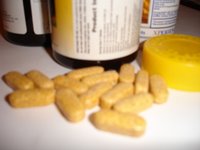 Is marijuana medically useful? Many people, from patients to doctors and scientists think so. The US Food and Drug Administration appears to disagree. These ideas are in line with what the Whitehouse, Drug Enforcement Administration, and some vocal congressmen think. However, in eleven states around America compassion hasn't taken a back-seat to politics and laws allowing medical marijuana have been passed. More on this subject in this week's Economist...
Is marijuana medically useful? Many people, from patients to doctors and scientists think so. The US Food and Drug Administration appears to disagree. These ideas are in line with what the Whitehouse, Drug Enforcement Administration, and some vocal congressmen think. However, in eleven states around America compassion hasn't taken a back-seat to politics and laws allowing medical marijuana have been passed. More on this subject in this week's Economist...Reefer madness
Apr 27th 2006
Marijuana is medically useful, whether politicians like it or not
IF CANNABIS were unknown, and bioprospectors were suddenly to find it in some remote mountain crevice, its discovery would no doubt be hailed as a medical breakthrough. Scientists would praise its potential for treating everything from pain to cancer, and marvel at its rich pharmacopoeia—many of whose chemicals mimic vital molecules in the human body. In reality, cannabis has been with humanity for thousands of years and is considered by many governments (notably America's) to be a dangerous drug without utility. Any suggestion that the plant might be medically useful is politically controversial, whatever the science says. It is in this context that, on April 20th, America's Food and Drug Administration (FDA) issued a statement saying that smoked marijuana has no accepted medical use in treatment in the United States. (more...)
________________________________________________
Update (12th May)
In response to this article, we have received a letter from John P. Walters, director of the White House Office of National Drug Control Policy--also known as the "Drug Czar". I would expect The Economist would publish this on its letter's page in the near future.
Commentary & comments from other blogs:
This article has inspired a lot of commentary, some of it useful.
One commentator here discusses the FDA's existing programme to supply cannabis medicinally. (more...)
From the Democratic Daily (here...)
Overview of the debate, Politics and Pot.
A critique of the Reefer Madness (here...)
More commentary, and my reply to one critique of the piece (more..)
Overview of the debate, Politics and Pot.
And a few more comments (here..)
________________________________________________
References
Nicoll, Roger & Alger, Bradley, 2004. The brain's own marijuana. Scientific American. December 2004.
Wilson, Clare, 2005. Miracle Weed, New Scientist, vol 185, issue 2485, p38.
Neuroprotection by delta-9-tetrahydrocannabinol, the main active compound in marijuana, against ouabain-induced in vivo excitotoxicity. The Journal of Neuroscience, 2001, 21 (17): 6475-6479.
Inter-agency advisory regarding claims that smoked marijuana is a medicine. FDA, April 20, 2006.
Medical Marijuana. American Medical Association, June 2001.
Marijuana and medicine: assessing the science base. 1999. Institute of Medicine.
Press releases
Doctor suggested cannabis for pain relief, says one in six medicinal users in the UK. Press release from McGill University.
Cannabis-based medicine relieves the pain of rheumatoid arthritis and suppresses the disease. Press release from Journal of Rheumatology, Oxford University Press.
Cannabis extract reduces pain in multiple sclerosis patients. Press release from British Medical Journal.
UK trial results on value of cannabis for multiple sclerosis patients. Press Release from the Medical Research Council.
Brain’s own cannabis compound protects against inflammation. Press release from journal Cell.
Hebrew University scientists develop prototype drug to prevent osteoporosis. Press release from Hebrew University of Jerusalem.
Cannabis-based drugs could offer new hope for inflammatory bowel disease patients. Press release from University of Bath.
Groups
Food and Drug Administration
Drug Enforcement Administration
Office of National Drug Control Policy
The National Organization for the Reform of Marijuana Laws
Multidisciplinary Association for Psychedelic Studies
Medical Marijuana ProCon.org
GW Pharmaceuticals
Marinol
